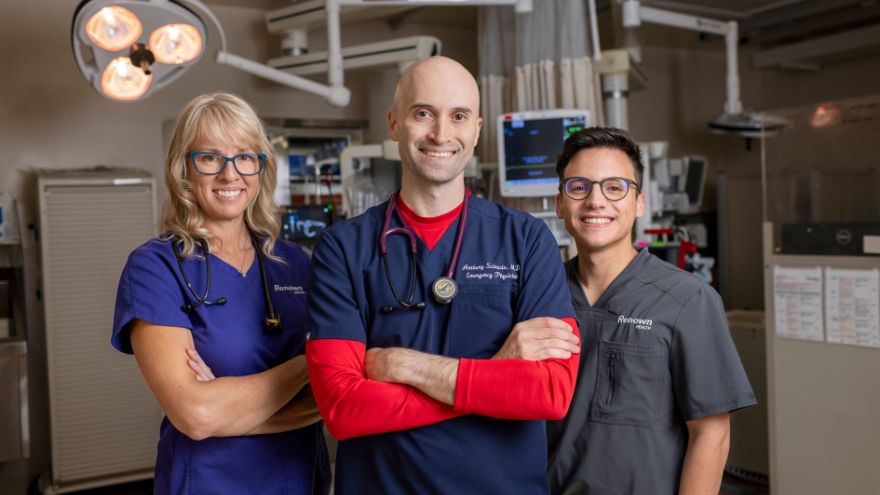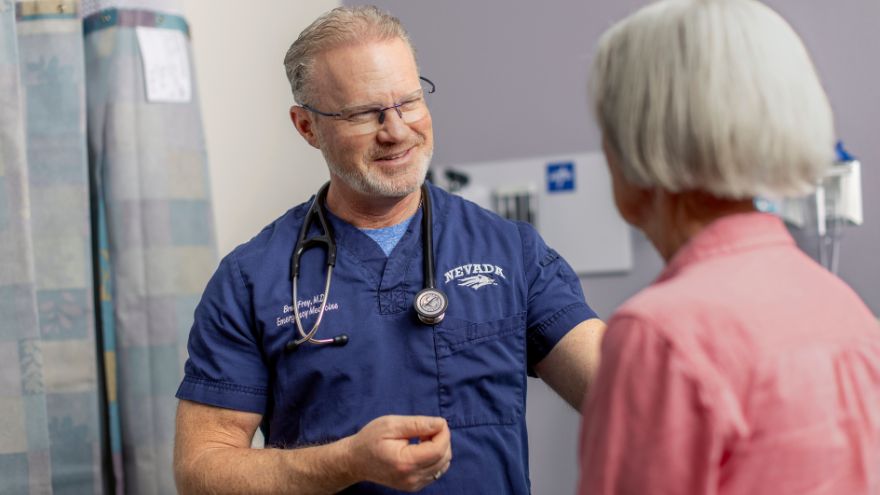Search
Results for 'primary care'
Clear-
When to Seek Care for Abdominal Pain
Abdominal pain is one of the most common complaints that brings individuals to the emergency room. We spoke with emergency physician Bret Frey, MD, to ask about when and where to seek care for abdominal pain. Dr. Frey advises that any time you feel something is developing inside your body that is substantially different from what is normal for you, understand that something is wrong. He further explains that warning signs of an acute medical situation include fever, vomiting or a rapid change in function and ability to move due to pain. These symptoms indicate that one needs to be evaluated by a medical professional. This evaluation will include the care team conducting an examination and asking a series of questions to determine if additional diagnostics, such as lab work or imaging, are needed. Be prepared to discuss where the pain is and what it feels like, in addition to how long it’s been bothering you and if it’s constant or intermittent. While appendicitis often comes to mind when thinking about abdominal pain, Dr. Frey says that this is not the bulk of cases that the Emergency Department sees. In fact, often the pain does not have a specific diagnosis, but our team of board-certified emergency physicians are experienced in assessing and caring for those experiencing the acute symptoms he described. “We often don’t come away with an answer about exactly what it is, but we substantially rule out life threats in a very methodical and systematic way,” said Frey. The abdomen includes many organs, including the stomach, liver, small and large intestines, gallbladder and pancreas. In addition, pain stemming from your chest, pelvis or back may be felt in the abdominal area. If you are experiencing abdominal issues that are persistent but not an emergency, talk to your primary care doctor about what you are experiencing, and be prepared to review the history of this pain, medications, allergies and diet. He or she will be a good partner to review conditions such as gas, heartburn, constipation, diarrhea, inflammation or menstrual and ovulation pain. Drinking plenty of water is always an important part of supporting your health.
-
Most Common Reasons Women Visit the ER
If you or someone you know is experiencing a medical emergency, it's essential to seek immediate attention by calling 9-1-1 or visiting the ER for a thorough evaluation by a trained medical professional and timely intervention. Access to a convenient and trusted emergency room (ER) is critical to any person’s healthcare needs, including medical emergencies related to women’s health. We explored some common scenarios and warning signs prompting women to seek immediate medical attention with Aiden Gould, Board-Certified Emergency Physician at Renown Health. When your medical emergency can’t wait, Renown ER is here to provide you with the region’s leading emergency care to diagnose and treat your condition or illness. Understanding Common Reasons Women Visit the Emergency Room Gynecological Emergencies: One of the most common reasons women may seek emergency care is due to gynecological emergencies such as severe pelvic pain, abnormal bleeding or complications related to pregnancy. These issues can be alarming and warrant immediate medical attention if the issue persists or is out of the ordinary for you. Emotional and Physical Well-Being: For those facing diverse medical or mental health emergencies, seeking prompt assistance is crucial for a thorough assessment and safe, timely intervention. Renown ER teams are equipped with trained professionals who provide compassionate care for individuals seeking help in the following situations: Suicide risk assessment and intervention Substance abuse assessment Assault and trauma care Crisis support and intervention Resources for ongoing care and well-being support Severe Abdominal Pain: Unexplained and severe abdominal pain that is substantially different than what is normal for you is a symptom you should never ignore as it can indicate underlying issues. Warning signs of an acute medical situation include fever, vomiting or a rapid change in motor function and inability to move due to pain. Respiratory Distress: Difficulty breathing, persistent coughing and other respiratory issues can be especially concerning. Women with pre-existing respiratory conditions like asthma or those experiencing sudden respiratory distress should seek immediate care from a medical professional. Warning signs of respiratory distress may include a significant change in one’s breathing rate, changing of the skin color to blue, gray or paleness due to lack of oxygen, nose flaring and chest retractions. Cardiovascular Emergencies: Heart-related issues are not exclusive to men. Women can also experience cardiovascular emergencies that often go undiagnosed because symptoms differ from men. Symptoms like chest pain, extreme fatigue, vomiting or pain in the abdomen, shortness of breath or palpitations should be evaluated by an emergency medical professional as timely intervention is critical in such cases. Renown leads the region in cardiology care with our technological expertise and patient-centered approach. Our comprehensive team diagnoses heart disease and other cardiac conditions, offering personalized treatment plans. Neurological Symptoms: Sudden and severe headaches, seizures or other neurological symptoms may prompt women to visit the ER if symptoms are extremely disorientating or debilitating. These symptoms could be indicative of various conditions from mild to severe, including strokes or neurological disorders that require prompt evaluation. Renown Regional Medical Center is a Comprehensive Stroke Center, providing primary stroke care including evaluation, treatment and education to patients who arrive at a Renown facility with the signs and symptoms of a stroke. Compassionate Care in Times of Need At Renown Health, we understand that your time is valuable, especially in emergency situations. That's why we strive to provide patients with exceptional care, compassion and respect. Plan ahead and make informed decisions about seeking medical care by viewing your estimated triage wait time at a Renown ER.
-
When Care Can’t Wait: True Stories of Renown ER
Renown Health is home to three 24/7 Emergency Rooms (ERs) providing comprehensive emergency and trauma care, access to specialists and inpatient services backed by the area's most extensive health system. In 2023, Renown Health cared for 132,340 patients across three ER locations. Renown is also home to the region’s only level II trauma centers for both adult and pediatric patients. We spoke to three patients who sought immediate medical attention for various ailments and conditions to learn more about their emergency care experience and why they chose Renown ERs. Kamrin’s Story: From Worrisome to Critical In the spring of 2021, Danielle and her 13-year-old son Kamrin visited his primary care doctor for unexplained vomiting and were promptly referred to Renown Children's ER via ambulance for further evaluation and seen by board-certified emergency physician, Dr. Lisa Nelson. What initially began as an unassuming doctor's visit quickly turned into something much more severe after several tests confirmed a devastating abdominal tumor and a stage-four cancer diagnosis, unbeknownst to the family. Kamrin was immediately admitted to the Pediatric Intensive Care Unit (PICU) and referred to a Pediatric Oncologist at Renown Children’s Hospital to begin his plan of care with expert pediatric hematology and oncology specialists. Regarding the board-certified physician, who delivered the results to the family, Danielle said, “She was so calming to us, even as the diagnosis haunted us. She led us by guiding our family through the unknowns. She felt like a family member to us in that moment, letting all the unknowns be well known.” “The love, empathy, support and guidance these employees gave us carried us. The care team quickly and easily became a source of relief, knowing we were their priority and in the best hands. We are forever grateful for the team at Renown Children's Hospital and Renown Children’s ER; they truly saved our son's life and continue to be our guiding light whenever it's needed in our son’s health journey,” Danielle said. Today, Kamrin is in remission and navigating the aftereffects of chemotherapy, including an immune system deficiency. However, his family chooses to navigate each day by embracing the positive side of things, such as the life-saving impact of his treatment. Did you know? Renown Children's Pediatric Hematology and Oncology is located within Renown Regional Medical Center and offers expert pediatric specialists dedicated to providing comprehensive treatment for pediatric hematology and oncology, including chemotherapy, radiation therapy and infusion services. Taylor’s Story: From Crisis to Recovery Promptly after cosmetic surgery performed by a medical professional not associated with Renown, Taylor Salas (Chacon) began to lose consciousness and notice her post-surgery drainage systems, also known as Jackson-Pratt drains, fill with blood. She was transported to Renown Regional ER via ambulance and immediately seen by ER staff and board-certified emergency physician Thea Berning, MD, for medical assessment. Taylor drifted in and out of consciousness as the ER team began blood transfusions and a CT scan to determine her plan of care. Dr. Berning began facilitating communication with a community plastic surgeon with privileges at Renown Health and emergency surgery was performed to stop Taylor’s internal bleeding. Taylor was placed on a ventilator due to respiratory distress and trauma from the event, then transferred to Renown’s Intensive Care Unit (ICU) to continue her care. Thankfully, Taylor listened to her gut when something didn’t feel right after her surgery and sought immediate medical attention. The ER team's quick response, communication and collaboration with a plastic surgeon saved Taylor from severe internal bleeding. “I was informed every step of the way about what was happening and why. I felt comfort in this,” she said. Did you know? Because of Renown Regional Medical Center’s Level II Trauma Center distinction, you have immediate access to an extensive list of specialists and physicians trained in a wide array of specialties, in the event of a traumatic injury or accident. This is one of the many benefits of Renown Regional’s Level II Trauma status. Ted’s Story: The Unsuspected Threat Bothered by symptoms of heartburn, fatigue, neck pressure and arm discomfort, Ted was in the middle of a busy workweek in June 2023 when he began to suspect something was wrong. Knowing the importance of addressing early heart attack symptoms immediately, Ted and his wife headed to Renown Regional ER because of proximity and some familiarity with Renown’s leading cardiology care and technological expertise. After prompt assessment by the Renown ER team, including blood work, imaging tests and the administration of medication, Ted was admitted to the hospital to treat the blockage and narrowing of his coronary artery. On June 8, Ted was admitted for treatment, where he successfully underwent a single bypass surgery and recovered in the Cardiac Intensive Care Unit (CICU), before being discharged and following up with the Intensive Cardiac Rehab (ICR) program at Renown. The ICR program at Renown played a pivotal role in Ted's 55-pound weight loss and overall health improvement, empowering him to embrace a healthier lifestyle and find ways to use his newfound energy and strength today. “Overall, I believe I had the best care possible because of the collective group of people at Renown caring for this community, who we could see in the grocery store, at the ball game and in the shopping malls. This community feeling is something you might not get in a big city hospital,” Ted said. Did you know? Intensive Cardiac Rehab at Renown Health is a medically supervised program designed to improve cardiovascular health after a significant heart condition or procedure. Since its inception in 2016, this program has been a pioneer in the region for cardiac rehabilitation focusing on three key pillars including exercise, nutrition and stress management.
Read More About When Care Can’t Wait: True Stories of Renown ER
-
Know when to visit an ER: Top 5 concerns
When a sudden illness or injury occurs, the emergency room (ER) provides immediate medical attention to those in need. Understanding the top reasons for visiting the ER can help people make informed decisions about seeking emergency care. Here are the five most common reasons people in Nevada visited an ER in 2023. 1. Abdominal pain One of the top reasons people visit the ER is abdominal pain. The abdomen has many organs, including the stomach, liver, small and large intestines, gallbladder and pancreas. Significant pain in this area can be a cause of concern. Warning signs of a serious problem include abdominal pain with fever, vomiting, and not being able to move or perform everyday tasks due to pain. Seeking medical attention when experiencing these symptoms is essential. Emergency physicians can perform abdominal exams, assess the condition and rule out significant threats. 2. Fever High fevers that do not get better with medicine and are accompanied by other symptoms can cause concern. This can indicate that the body is fighting off an infection or illness. Fever with symptoms like vomiting, pain, altered mental status, shortness of breath or inability to perform daily functions are warning signs to watch out for. Adults and children should visit an ER, where the team can assess the causes of the fever. 3. Chest pain and shortness of breath Chest pain and discomfort, or pain in the upper body can suggest warning signs of a heart attack. If a person is experiencing signs of a heart attack, call 911 immediately to ensure timely treatment or assessment by a medical professional. Heart attack symptoms include: Chest pain, including pain that can be described as chest pressure, heaviness or squeezing Discomfort in the chest, arms, back, neck, shoulders and jaw Difficulty breathing Sweating with any of the above symptoms When visiting a Renown ER for chest pain, a trained medical professional will promptly perform an Electrocardiogram (EKG) in an area where preliminary assessments, also known as triage, take place. Individuals experiencing shortness of breath or trouble breathing, whether from a respiratory infection, asthma complications or other pre-existing conditions should not ignore symptoms as these can signify more serious issues. Warning signs of respiratory distress may include: A significant change in breathing rate A significant change in the amount of energy used to inhale or exhale when breathing Changing of the skin color to blue, gray or paleness, which can indicate a lack of oxygen Nasal flaring Chest retractions, which can suggest difficulty bringing air into the lungs What this looks like: the chest sinking in just below the neck, breastbone or rib cage while breathing 4. Neurological symptoms Sudden and severe headaches or seizures may prompt individuals to visit the ER if symptoms are extremely disorientating or debilitating. These symptoms could be indicative of various conditions, including strokes or neurological disorders that require prompt evaluation. If a person is experiencing signs of stroke, call 911 immediately to ensure timely treatment. Stroke symptoms include: Numbness, weakness or loss of movement in the face, leg or arm, especially on one side Confusion, including trouble speaking or understanding Trouble with vision or loss of balance When choosing emergency care for signs and symptoms of stroke, a Comprehensive Stroke Center can provide patients with immediate intervention, including evaluation, treatment and education. 5. Cough/flu-like symptoms Emergency departments are staffed by medical professionals trained to prioritize and treat emergency and trauma situations. Receiving care at an ER should be reserved for severe symptoms and life-threatening conditions. It’s best to schedule a visit with a primary care physician for mild cold and flu symptoms. Most urgent care locations are equipped with rapid testing options, including RSV, COVID-19, influenza, mononucleosis, urinary issues and strep throat. It is critical to distinguish between common respiratory infections and more severe cases, such as pneumonia or complications from the flu. Symptoms that may warrant a visit to the ER include: Rapid decline in the ability to perform regular daily activities Coughing or throwing up blood Severe dehydration and inability to drink fluids High fever not responsive to medication Understanding top ER visits in Nevada While these ER complaints are common reasons for emergency room visits in Nevada, it's important to remember that emergency care is available for all immediate medical needs. Do not hesitate to seek help at an emergency room if someone experiences a sudden or severe health concern. Quick and appropriate action can make a significant difference in keeping you and your loved ones healthy. Renown Health is the largest locally governed, not-for-profit healthcare network in northern Nevada, providing leading emergency and trauma care by board-certified emergency physicians 24/7 at three locations, including the region’s only pediatric emergency department. Renown Health emergency rooms prioritize swift assessments, advanced diagnostic tools and compassionate care, providing leading emergency and trauma care. Trust Renown ER for not just emergency care but exceptional care. Learn more at renown.org/ER.



